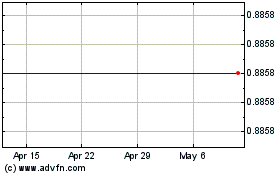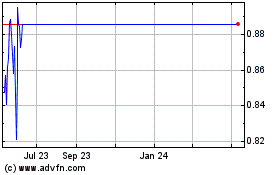Mozambique Fraud Trial Begins as Voters Go to the Polls
October 15 2019 - 3:20PM
Dow Jones News
By Gabriele Steinhauser and Matthieu Wirz
The trial against one of the alleged ringleaders behind $2
billion in fraudulent loans to Mozambique kicked off in New York on
Tuesday, the same day citizens of the southern African nation cast
judgment at the ballot box on whether their government had done
enough to hold accountable officials involved in the secret
deals.
Mozambique, one of the world's poorest countries, plunged into a
debilitating crisis after the loans were disclosed in 2016,
following reporting by The Wall Street Journal. The loans, some of
which hadn't been disclosed to other investors or the public, were
arranged by Credit Suisse Group AG and Russian bank VTB Group for
naval and tuna-fishing projects that never materialized.
The International Monetary Fund and other multilateral
institutions suspended lending to the country after the disclosure.
Within months, the government of President Filipe Nyusi defaulted
on its debts, constraining funding for social and other
programs.
"Life has become more difficult," said Marisa Mabai, after
casting her ballot in the capital Maputo on Tuesday morning. Ms.
Mabai said she lost her job as a warehouse manager at a biscuit
factory when the economy stumbled in 2017. "We are suffering for
something that has been done by those politicians," she said.
President Nyusi, who was Mozambique's defense minister at the
time the loans were arranged, has staked his campaign on a promise
to fight corruption in the nation of 30 million people. But the
fallout from the scandal has hurt the standing of his Frelimo
party, which has ruled Mozambique since gaining independence from
Portugal in 1975, especially with urban voters.
Thousands of miles away in a Brooklyn federal court, jury
selection began in the trial of Jean Boustani, a Lebanese former
executive of Abu Dhabi-based shipbuilding company Privinvest Group.
The company received most of the loan proceeds, but the fishing and
security fleets it contracted to provide never became
operational.
U.S. prosecutors allege that Mr. Boustani conspired with
Mozambican officials and former Credit Suisse bankers to create the
maritime projects as fronts to borrow the $2 billion, which they
say was used to pay at least $200 million in bribes and
kickbacks.
Mr. Boustani has pleaded not guilty in the case and
unsuccessfully argued the case should be dismissed because his
alleged offense "falls outside the reach of the U.S."
Three former Credit Suisse bankers were arrested in London in
January and pleaded guilty to some of the charges in the case. They
face potential jail sentences of up to 20 years. The U.S. is also
seeking the extradition of Mozambique's former finance minister,
Manuel Chang, from South Africa, where he has been held on a U.S.
warrant since December. Mr. Chang has denied wrongdoing and says he
wants to be extradited to Mozambique.
The U.S. efforts to prosecute the alleged ringleaders behind the
debt scandal contrast with what many observers say has been the
slow pace of justice in Mozambique. It took the publication of the
U.S. indictment in January for Mozambican authorities to charge 20
people -- including the son of a former president, the former head
of state security and Mr. Chang -- in connection with the case.
Lawyers for the accused couldn't be reached to comment Tuesday.
Opposition parties in Mozambique stand to gain from the scandal.
Ossufo Momade, the leader of the opposition Renamo party, may be
able to force a runoff with Mr. Nyusi, as some analysts say that
the president risks falling below 50% in the first round of voting.
Renamo also could win governorships for the first time in several
provinces; the positions until now had been appointed by the
central government.
"We are paying the debt without knowing why," said Damião
Cumbane, a 50-year-old public servant who said he was voting for
the opposition after seeing his bills for water and electricity
rise.
Whoever wins Tuesday's vote will oversee the distribution of
revenues from natural-gas projects off the coast of northern
Mozambique. Total SA, Eni SpA and Exxon Mobil Corp. have said they
would invest as much as $50 billion in projects to export liquefied
natural gas from the country, deals that could transform an economy
that last year generated a gross domestic product of just $14.4
billion.
The high stakes have raised tensions in the run-up to the vote.
Last week, the head of a local observation mission was shot dead in
the southern city of Xai-Xai, and the police said they were
investigating the alleged involvement of some of its own officers
in the killing. Opposition parties and civil society have
complained about voter intimidation and insufficient voter
registration in areas hit by two violent cyclones earlier this
year.
It will take several years for the bulk of the exports from the
gas projects to start flowing and even longer for the benefits to
reach most Mozambican citizens.
"The fear is that the hopes among Mozambicans that the money
from the gas will lead them out of poverty in five to 10 years are
not going to come true," said Zenaida Machado, a researcher with
Human Rights Watch in Mozambique. "Because in five to 10 years
there will still be this debt and other bills to pay."
--
Luis Nhachote
contributed to this article.
Write to Gabriele Steinhauser at gabriele.steinhauser@wsj.com
and Matthieu Wirz at matthieu.wirz@wsj.com
(END) Dow Jones Newswires
October 15, 2019 15:05 ET (19:05 GMT)
Copyright (c) 2019 Dow Jones & Company, Inc.
Credit Suisse (NYSE:CS)
Historical Stock Chart
From Mar 2024 to Apr 2024

Credit Suisse (NYSE:CS)
Historical Stock Chart
From Apr 2023 to Apr 2024
